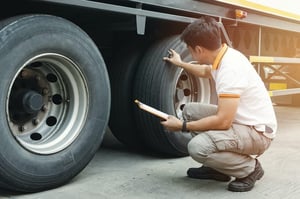 When it comes to choosing a carrier, safety is paramount.
When it comes to choosing a carrier, safety is paramount.
If something goes amiss (like an accident), you won't just lose goods. Roadway incidents can also lead to damage, lawsuits and reputation-tarnishing press. Poor safety habits can endanger lives — which is something no one wants on their conscience.
Of course, much of this responsibility is in the hands of your carrier. Although not all incidents are preventable, it’s crucial they’re following all necessary protocols even (and especially) when no one is watching.
But while many carriers claim to take appropriate safety measures, how can you ensure they adhere to the standards they put in place?
Here are a few things to keep in mind as you look for trucking services from heavy haul and project shippers.
Carrier Safety Commitment
Always ask about a carrier’s company safety rules. Although all carriers must follow federal guidelines, like those outlined by the Federal Motor Carrier Safety Administration, many take it a step further by developing and implementing their own safety benchmarks and protocols. Ask about their specific regulations and what they do to ensure Drivers follow these action items when behind-the-wheel. It's also important to ensure their vehicles are in prime condition.
For example, carriers are required to maintain their fleet and submit to annual inspections — but some carriers adhere to a more frequent, proactive maintenance schedule far beyond federal standards.
Additionally, look for carriers who include safety as a primary tenet of their culture. For example, at ATS, we consider our operationally owned safety culture our “secret sauce.” Safety isn't only part of our process — it’s integrated into every training topic and touchpoint we deliver to everyone on our team.
Technology That Protects Your Freight
Transportation technology has evolved significantly over the past two decades. Today, carriers have plenty of options to help mitigate risk. This is critical given large trucks accounted for nine percent of all vehicles involved in fatal crashes in 2017, according to data from the National Highway Traffic Safety Administration (NHTSA). Furthermore, human error accounts for as much as 96 percent of all motor vehicle crashes, according to data shared by Digital Trends, the largest independent premium technology publisher in the world.
When evaluating your options, always look for carriers that invest in technology designed to reduce the frequency and severity of crashes. This is an excellent indicator the company cares about public safety.
For example, sophisticated dashcam technology that includes artificial intelligence (AI) and machine vision can capture and analyze driving data, and send that information back to the carrier. If the carrier notices unsafe patterns, such as lane departures or distracted driving, they can intervene.
The Driver Interview and Training Process
Of course, a carrier can only do so much from their headquarters. No matter what rules they create, it’s up to the Drivers to follow protocol and commit to safe habits.
Be sure to ask about your carrier’s Driver hiring process. How many years of CDL experience do they require? Are Drivers required to pass a road test before they’re hired? What ongoing specialized training or programs — such as defensive driving — does the carrier provide Drivers to keep them refreshed on freight transportation and security guidelines?
Previous Accidents and Lawsuits
It’s rare for heavy haul trucking companies and other carriers not to have at least some number of accidents each year. But some incidents can be more costly than others.
For example, a so-called “nuclear” verdict occurs when a trucking company is penalized with a fine exceeding $10 million, according to FreightWaves, but it could also be used to describe any situation in which the jury award is significantly higher than the expectation. Along with rising insurance premiums, a nuclear verdict can bankrupt a carrier and force them to shut down. But even if it doesn’t bankrupt a carrier, they may increase rates to cover the risk of doing business in states where nuclear verdicts are common.
When evaluating any shipper, including multimodal and/or multi-phase project shippers, ask about the rate of incidents, as past performance is often a good indicator of future issues. But be sure to keep the size of the carrier in mind. For example, a company with a 15,000-truck fleet will likely have more accidents than one with 100 trucks. Higher-than-average incident rates may not only indicate a higher risk for accidents, but such events could create delays in project schedules.
As a professional grappling with consistently tight deadlines, you understand that efficiency and speed are essential — but not at the cost of safety. Unfortunately, not all carriers share this same mentality.
To ensure the safety of your shipments, you need to choose a partner that goes beyond making trucking industry safety a priority. The right carrier will make safety the primary corporate value that drives every decision of every employee — every single day.



